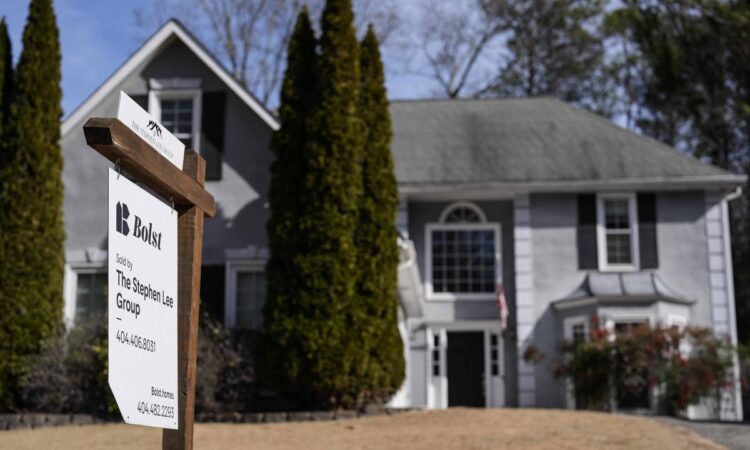
LOS ANGELES (AP) — Home loan borrowing costs fell for the second week in a row, pulling the average long-term U.S. mortgage rate to its lowest level since early February — good news for prospective home shoppers as the spring homebuying season gets underway.
The average rate on a 30-year mortgage dropped to 6.74% from 6.88% last week, mortgage buyer Freddie Mac said Thursday. A year ago, the rate averaged 6.60%.
Borrowing costs on 15-year fixed-rate mortgages, popular with homeowners refinancing their home loans, also fell this week, pulling the average rate down to 6.16% from 6.22% last week. A year ago it averaged 5.90%, Freddie Mac said.
“Despite the recent dip, mortgage rates remain high as the market contends with the pressure of sticky inflation,” said Sam Khater, Freddie Mac’s chief economist. “In this environment, there is a good possibility that rates will stay higher for a longer period of time.”
The recent pullback in rates follows a string of rate increases. Mortgage rates rose for most of February as stronger-than-expected reports on inflation and the economy fueled speculation among bond investors that the Federal Reserve would have to hold off on cutting interest rates longer than expected.
The Fed has signaled that it will likely cut its key interest rate this year, once it sees more evidence that inflation is falling sustainably back to its 2% target. The Fed’s main interest rate is at its highest level since 2001.
Investors’ expectations for future inflation, global demand for U.S. Treasurys and what the Fed does with interest rates can influence rates on home loans.
Economists expect that mortgage rates will ease further this year, though most forecasts have the average rate on a 30-year mortgage going no lower than 6% by the end of the year. But that’s not likely to happen until the Fed begins cutting its short-term interest rate, something Wall Street is largely betting won’t happen until June, according to data from CME Group.
Despite the choppy trajectory in mortgage rates this year, the average rate on a 30-year home loan is still down from the 23-year high of 7.79% it reached in late October.
“Rates are much lower than they were last fall when they hovered near 8%,” said Lisa Sturtevant, chief economist at Bright MLS. “Any downward trend in rates later this spring will bring more buyers and sellers into the market.”
The decline in rates since their peak last fall has helped lower monthly mortgage payments, providing more financial breathing room for homebuyers facing rising prices and a shortage of homes for sale.
Lower rates helped lift sales of previously occupied U.S. homes by 3.1% in January versus the previous month to the strongest sales pace since August.
Still, the average rate on a 30-year mortgage remains well above where it was just two years ago at 4.16%. That large gap between rates now and then has helped limit the number of previously occupied homes on the market by discouraging homeowners who locked in rock-bottom rates from selling.






